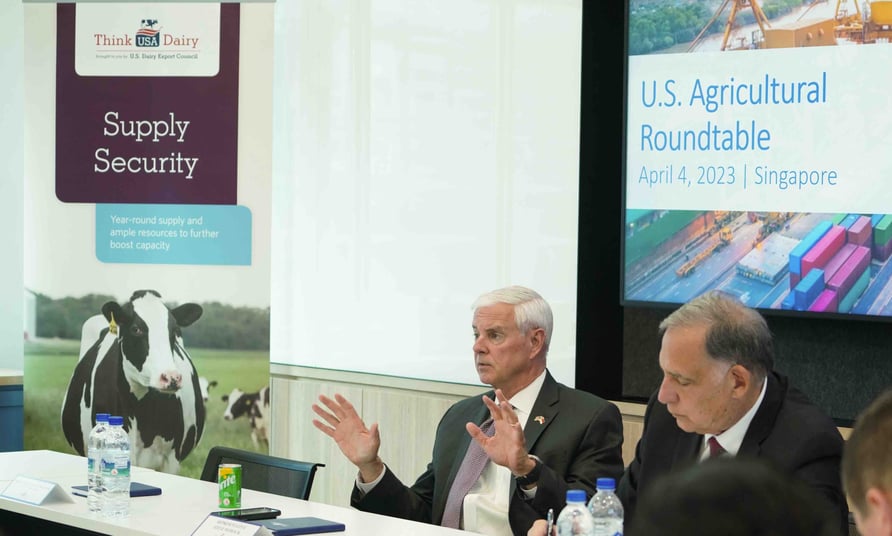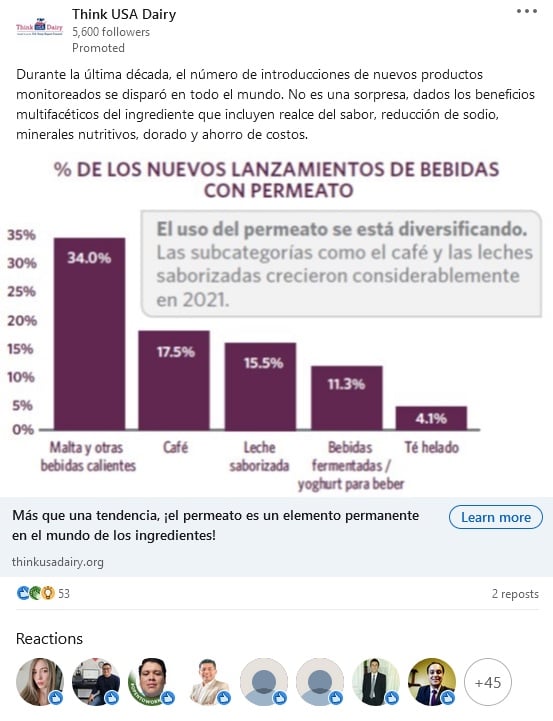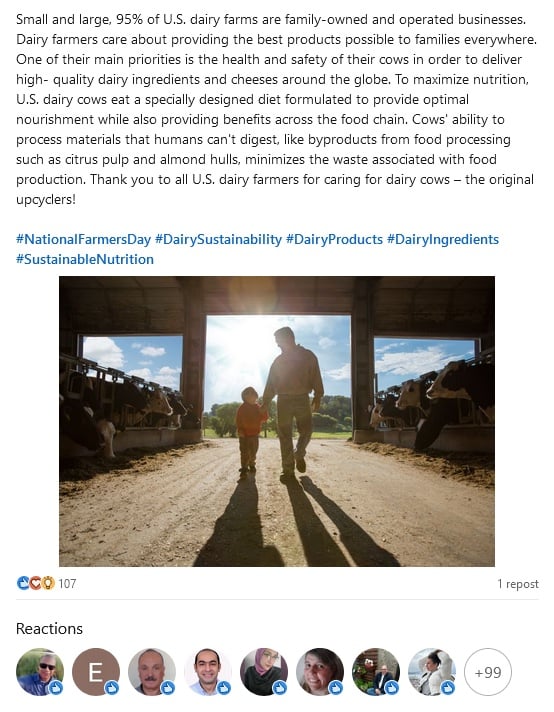HIGHLIGHTS: April 7, 2023
• Member opportunity: global recognition at WDS, UNFSS
• Legislators visit U.S. CDE
• Letters call for increase in MAP, FMD funding
• February dairy export results
• India publishes integrated health certificate
• USDEC strengthens targeted LinkedIn outreach
• Board meeting presentations now online
• Market Summary: GDT keeps falling
• ALIC slates new butter tenders
• Dairy citations plentiful in USTR trade barrier report
• APHIS updates VS Form 16-4
• March updates to USDEC Export Guide
• Company news: Emmi, Grande Cheese, Saputo, TempoScan
Featured
Seeking USDEC nominations: IDF Innovation Awards and UN FSS Stocktaking Compendium
USDEC invites members to submit their companies’ names for potential recognition at two prestigious global events.
IDF Innovation Awards
The annual International Dairy Federation (IDF) Innovation Awards are designed to demonstrate the engagement and dynamism of the dairy sector worldwide, offering a unique platform to showcase innovative processes, practices and products that improve efficiency and contribute to the UN Sustainable Development Goals. This is a unique opportunity for USDEC members to submit success stories and potentially be featured as award winners during the high-profile awards ceremony at the IDF World Dairy Summit (WDS), which will take place Oct. 16-19 in Chicago.
This year’s awards focus on sustainable and community-led initiatives, as well as new product development and innovative practices. IDF is inviting entries in nine categories:
- Innovation in sustainable farming practices: a) environment, b) animal care, c) socio-economic
- Innovation in sustainable processing
- Innovation in sustainable packaging
- Innovation in new product development with a focus on food safety and consumer nutrition
- Innovation in Women empowerment in the dairy sector
- Innovation in Climate Action
- Innovation in Marketing & Communication initiative building dairy category
Ensuring robust award submissions—and hopefully some U.S. winners—is an important component of maximizing the value of the IDF WDS for U.S. dairy and showcasing U.S. global leadership in innovation and sustainable production. We encourage your organization to consider submitting an appropriate program or initiative for the awards to take advantage of this once-in-a-generation opportunity to win such awards on our home turf. The deadline for entries is June 1, 2023.
To learn more about the awards, click here. If you are interested in providing a submission or have any questions, please contact Kelly Sheridan, USDEC vice president, Environmental Affairs, at ksheridan@usdec.org.
UNFSS Stocktaking Compendium
In addition to the IDF Innovation Awards, the USDEC Sustainability and Multilateral Affairs team is working across the U.S. dairy industry to compile exemplary food systems stories and practices for inclusion in a compendium that is set to be released as a part of the United Nations Food Systems Summit (UNFSS) Stocktaking Moment in July 2023.
The UNFSS Stocktaking Moment marks two years since the original UNFSS. It will bring together stakeholders in Rome to share progress on national food systems pathways. USDEC expects it to generate media coverage and reignite conversations potentially critical of dairy, trade and animal protein in the context of sustainable food systems.
Ensuring the U.S. dairy industry is well represented in submissions to the Food Systems Coordination Hub is an important proactive effort to help promote the critical role of U.S. dairy exports in sustainable global food systems. It may also mitigate negative policy recommendations and/or media coverage from the July meeting that could harm U.S. dairy market access or otherwise constrain dairy demand.
Additional information regarding this opportunity, including the submission template, is available here. Multiple submissions can be put forward for consideration by a single organization. The submission deadline is Friday, May 5, 2023. If you have ideas or questions, please contact Janice Giddens, USDEC vice president, Sustainable Nutrition, at jgiddens@usdec.org.
Boozman, Womack hear about the benefits of MAP, FMD during visit to U.S. CDE in Singapore
On April 4, USDEC welcomed a visit by Sen. John Boozman (R-AR), the ranking member of the U.S. Senate Committee on Agriculture, and Rep. Steve Womack (R-AR) to the U.S. Center for Dairy Excellence in Singapore. The legislators came for a roundtable discussion on U.S. efforts to build agricultural trade in the region with USDA cooperators, U.S. agricultural companies and U.S. embassy staff in Singapore.
USDEC responded to questions from the members of Congress about the vital role the Foreign Agricultural Service’s Market Access Program (MAP) and Foreign Market Development (FMD) program play in supporting U.S. dairy exports. Dali Ghazalay, with the USDEC Southeast Asia office, explained how USDEC utilizes the funding to maximize opportunities for U.S. dairy exports to the region.
The message was one Sen. Boozman heard twice this week (see story on MAP, FMD letters below).

Left to right: Rep. Steve Womack and Sen. John Boozman discuss U.S. dairy and ag trade with USDA cooperators, U.S. agricultural companies and U.S. embassy staff at this week’s agricultural roundtable at the U.S. CDE in Singapore.
The importance of FTAs
Responding to the additional questions from Sen. Boozman and Rep. Womack, USDEC also reiterated the need for new trade agreements, especially with key Southeast Asian markets.
USDEC continues to emphasize to members of Congress that over the past decade, our two most formidable competitors—New Zealand and Europe—have been much more active negotiating free trade agreements and the U.S. cannot afford another lost decade. While efforts like the Indo-Pacific Economic Framework would be steps forward, they are not replacements for opening new markets.

Leader of USDEC’s Southeast Asia office Dali Ghazalay (center) highlighted the impact of the MAP and FMD programs as well as how the U.S. dairy industry’s investment in the U.S. CDE demonstrate the commitment of U.S. dairy to the Southeast Asia market and helps support U.S. export growth.
Letters highlight value of MAP, FMD, urge increased funding
USDEC, NMPF and more than 120 members of the U.S. Coalition to Promote Agricultural Exports co-signed three letters to congressional leaders emphasizing the value of the Foreign Agricultural Service’s Market Access Program (MAP) and Foreign Market Development (FMD) program and the need to increase funding.
All three letters emphasized the value of the programs, citing USDA research showing that every dollar invested in the programs between 1977 and 2019 returned on average $24.50 in annual export value. During that same period, the programs increased export revenue by $9.6 billion annually and added $12.2 billion to farm cash receipts.
Ag Appropriations Subcommittee letters
Two letters sent to the leaders of the House and Senate, on the Committee on Appropriations’ Subcommittees on Agriculture, urged them to not only fully fund MAP and FMD at $200 million and at least $34.5 million, respectively, but also provide an additional $7 million for USDA administrative and operational costs. The letter explains that government funding for MAP and FMD hasn’t increased since 2006. After inflation and mandatory budget cuts through sequestration, the real value of the MAP program is about $124 million and FMD is less than $20 million, far under their authorized levels. The additional $7 million for USDA would begin to reverse the trend of lost program value, the coalition said.
Senate Ag Committee letter
The third letter went to the leaders of the Senate Committee on Agriculture, Nutrition and Forestry, urging them to support Senate Bill 176, the bipartisan “Enhancing Agricultural Exports Act,” by including it in the Committee’s reauthorization of the farm bill. The legislation, which the coalition helped introduce last fall (see Global Dairy eBrief, 11/4/22), would double the investment in MAP and FMD “at a time of tremendous need for both programs,” the letter stated.
“The U.S. is losing ground as other countries across the European Union and throughout Asia try to replicate the success of our promotion programs by developing and investing in their own,” the organizations said.
“Please continue the legacy of success for these programs by investing in them as part of the new farm bill,” the letter concludes.
U.S. dairy export growth softens in February
Year-over-year U.S. dairy export volume (milk solids equivalent) rose for the 11th straight month in February, but it was the smallest increase since the start of the streak. U.S. dairy export volume gained just 0.8% (+1,430 MT MSE); the April 2022 increase was +0.3% (+674 MT MSE).
The February increase was driven almost entirely by lactose, which surged (+32%, +9,322 MT), along with some help from WPC80+ (+9%, +472 MT) and MPC (+34%, +965 MT). Cheese and NFDM/SMP were virtually flat. But low-protein whey products exported under HS code 0404.10 declined by 9% (-3,837 MT), and fat-heavy products slid considerably: butter -32%, -1,615 MT; AMF -82%, -1,377 MT; and WMP -41%, -1,332 MT.
February U.S. export value fell 3% to $674.7 million. It was the first decline in over two years as lower dairy product prices and a higher proportion of the export portfolio supported by lactose pulled down the average unit value.
The overall ups and downs of the February numbers were summed up by the results in two regions: Southeast Asia (down) and Latin America (up). For more analysis of those two regions and overall U.S. export performance in February, read the U.S. Dairy Export Blog article, “U.S. dairy exports eke out another volume increase in February.” In addition, go to the U.S. Exports section of the USDEC Data Hub and experiment with the interactive charts to find the information you are seeking.
India publishes final integrated health certificate
India's Department of Animal Husbandry and Dairying (DAHD) published an Office Memorandum, dated March 31, that includes a final version of a new integrated veterinary health certificate for dairy imports into India. This integrated certificate includes language from both the DAHD model certificate now in use and the Food Safety and Standards Authority of India (FSSAI) certificate that had been planned for implementation but was pulled back earlier this year. (See USDEC Member Alerts of March 16 and Feb. 27 for more on the saga of the certificate.) The new integrated certificate notes immediate entry into force, with a 60-day grace period in which the DAHD certificate will be permitted.
As a reminder, the U.S. government will not endorse the DAHD certificate or the new integrated certificate.
See Volume 2 of the USDEC Export Guide for more information on this new integrated certificate and a link to FSSAI's list of the products for which it is expected to be required.
USDEC's MARA and Trade Policy teams are continuing to work closely with the U.S. government to address the market access challenges in India because of member interest in the market. Contact Sandra Benson at sbenson@usdec.org with questions on the new certificate requirements.
USDEC strengthens outreach through LinkedIn
The USDEC customer-facing LinkedIn channel has proved to be a valuable tool to elevate U.S. dairy strengths and engagement across key U.S. markets. Beginning in Q4 of 2022, the Ingredients and Cheese marketing teams have been using the extreme targeting capabilities of the LinkedIn platform to dramatically increase the number of qualified individuals that receive, consume and interact with Think USA dairy messaging on LinkedIn. That messaging—in English and Spanish—focuses on the benefits of U.S. dairy ingredients and products and U.S. dairy sustainability to markets in the Middle East, Egypt, Mexico, Latin America and Southeast Asia.
“We are strategically evolving our approach to certain social channels for ThinkUSAdairy to deepen engagement and take the channel to new heights,” said Kara McDonald, vice president, marketing communications.
The strategy is already paying dividends. Followers have grown from 900 to more than 5,500, and the overwhelming majority of them are food and beverage manufacturing personnel outside the United States. Every month, more than 1,500 people visit the Think USA dairy page on LinkedIn—up from about 100—and about 2,500 people visit the Think USA dairy website from LinkedIn. About 8,000 people on average interact with ThinkUSAdairy posts every month, and posts can receive hundreds of reactions and shares.
“The progress has been very promising, and we will continue to evolve the scope and type of content we post and tailor and target who we reach,” said McDonald.
Staff plans to further refine the content to leverage the most engaging imagery and expand to other languages.


Two recent posts from USDEC’s customer-facing LinkedIn channel.
Events
Board meeting presentations now online
USDEC has posted videos of many of the presentations from the USDEC Spring Membership Meeting in the Meetings & Webinars section at www.usdec.org. If you missed the event or want to rewatch a particular presentation, click on USDEC Spring 2023 Board of Directors and Membership Meeting and scroll down.
Market Summary
Prices keep falling on GDT
The Global Dairy Trade (GDT) Price Index declined 4.7% at the April 4 auction. It was the largest of four straight losses, and there are no real signs of a rebound in sight.
North Asia (China) dominated buying but had little competition from other regions and no appetite to push prices higher. Chinese buyers purchased more WMP than at the previous event, but purchase levels fell for all other major products.
The average winning WMP price fell 5.2% to US$3,053/MT. It hasn’t dipped below the US$3,000/MT benchmark since November 2020 but appears headed in that direction. SMP fell 2.5% to US$2,579/MT, marking seven out of eight straight auction declines. AMF plunged 7.2% to US$4,736/MT and butter dropped 3.3% to US$4,595/MT.
The only increase came in cheddar. Prices corrected a little—+3.8% to US$4,167/MT—after wholesale declines over the previous two auctions sliced more than US$1,000/MT from the average winning price. Fonterra Co-operative Group reduced cheddar allocations over the next 12 months by 300 MT prior to the auction, also providing some support.
ALIC sets first butter tenders of fiscal 2023
Japan’s Agriculture and Livestock Industries Corp. (ALIC) announced plans for the first dairy tenders of the new fiscal year. New SBS tenders for butter are set for April 13 and May 11 for 1,500 MT each. For more information, contact USDEC’s Japan office at usdecjapan@marketmakers.co.jp or (011) 81-3-3221-6410.
Trade Policy
USTR report highlights barriers to U.S. dairy trade
The 2023 National Trade Estimate Report on Foreign Trade Barriers highlights numerous impediments to dairy trade drawn from 39 pages of joint comments submitted last October by USDEC and NMPF.
The 466-page document covers 64 key U.S. export markets and regions and includes references to dairy trade issues. Milk and dairy products are cited more than 150 times in the report, which highlights unscientific import requirements, tariffs, country-of-origin labeling and many other issues hampering U.S. dairy trade, including Egypt’s halal regulations, Canada’s violations of the U.S. Mexico Canada Agreement, and the European Union’s efforts to monopolize common food names.
The USTR press release on the National Trade Estimate Report also specifically cites Indonesia’s facility registration requirements for dairy, meat and rendered products as a major barrier affecting U.S. agricultural trade.
UK forges ahead with trade deals
The UK made progress on two trade agreements at the end of March. The UK Parliament passed the Trade (Australia and New Zealand) Bill, clearing the biggest remaining hurdle to that deal. The deal could be implemented as early as mid-year. (Click the following links for more information on the UK deals with New Zealand and Australia.)
Britain also said it finalized an “outline agreement” to join the 11-country Comprehensive and Progressive Agreement for Trans-Pacific Partnership (CPTPP). The UK will be the first new member since the signing of the original CPTPP agreement in 2018. Full details of the terms were not reported, but AHDB summarized expectations here.
Market Access and Regulatory Affairs
APHIS updates VS 16-4 export certificate
USDA's Animal and Plant Health Inspection Service (APHIS) revised the VS 16-4 Export Certificate for Animal Products template. The new JUL 2022 version is similar to the previous MAR 2010 version but moves an animal health statement from the pre-printed template to the additional declarations section on the certificate. For more details, see the USDEC April 5 Member Alert, “APHIS updates VS 16-4 export certificate.”
Exporters should immediately begin utilizing the new JUL 2022 versions of the VS 16-4 forms. APHIS is informing trading partners that either the MAR 2010 or JUL 2022 versions may be endorsed until June 4, 2023, and after that time only the JUL 2022 versions will be endorsed. To account for transit times, APHIS has asked that trading partners inform their port officials to accept either version of the form until Sept. 4, 2023.
U.S. dairy exporters use the VS 16-4 template for exports of all dairy products to Mexico, fluid milk to Taiwan, and dairy for animal feed to most countries. This modification does not impact APHIS certificates not printed on the VS 16-4 (i.e. Australia, New Zealand) or any certificates issued by AMS.
All applicable countries in Volume 2 of the USDEC Export Guide now contain links to these updated templates. Contact Sandra Benson at sbenson@usdec.org with questions.
USDEC updates 74 Export Guide documents in March
USDEC’s Market Access and Regulatory Affairs (MARA) team updated or revised 74 documents in the USDEC Export Guide last month. Changes include:
Volume 1: Tariffs and Classification
- Jordan: Noted decreases to several tariff rates, including evaporated and condensed milk, and food preparations of HS 1901.90 and 2106.90.
- Pakistan: Noted sales tax increase from 17% to 18%.
- Venezuela: Noted a decrease in WMP and lactose tariff rates to 2%.
Volume 2: Import Requirements
- Colombia: Updated the INVIMA and ICA fees for 2023, specifically for Plant Registration, Sanitary Import Permit and Product Registration; updated Sample Import Requirements.
- Egypt: Added and clarified Advanced Cargo Reporting registration requirements, including the need for a different shipment identification number (ACID number) per Bill of Lading.
- Export Party Screening (all countries): The Office of Foreign Assets Control (OFAC) website has changed to https://ofac.treasury.gov/. Updated all links to OFAC screening lists and guidance.
Volume 3: Compositional Standards and Labeling Requirements
- Brazil: Added standards for ricotta and provolone cheeses.
- China: Updated food additives document; added the list of approved cultures for food use to “other regulations” section.
- Japan: Updated food additives document.
- United Arab Emirates: Labeling standard is completely revised.
Every month, USDEC’s Market Access team emails a list of guide updates to interested members. If there is anyone at your company who should be included on the distribution list for that email in the future, please contact Jessica Smith at jsmith@usdec.org.
Company News
Emmi opens new goat’s milk powder facility, reorganizes
Swiss cheese manufacturer Emmi is looking to capitalize on rising global demand for goat’s milk powder. The company formed a new division—Emmi Nutrition Solutions (ENS)—focused exclusively on goat’s milk powder manufacturing, new product development and marketing.
ENS consolidates activities of Emmi’s AVH dairy trading business and manufacturer Goat’s Milk Powder. The company is backing the venture with a new CHF40 million (about US$44 million) goat’s milk powder manufacturing facility in Etten-Leur, Netherlands. In addition to infant formula, Emmi plans to expand its goat’s milk powder portfolio to a range of products, including special nutrition for adults and seniors and products targeting consumers seeking healthy and active lifestyles. (Company reports)
Mergers, acquisitions and joint ventures
Wisconsin-based Grande Cheese purchased the former Foremost Farms cheese plant in Chilton, Wisconsin. Grande operates eight other manufacturing facilities in the state. … Saputo is selling fresh milk processing facilities in Australia to retailer Coles Group for A$95 million (about US$64 million). Saputo called the sale an important step in executing its long-term vision for success in Australia. ... German dairy processor Hochwald is buying the Tuffi brand from Müller Group and seeking to purchase the Landliebe label as well. German regulators required Müller to divest the brands as part of its deal to purchase portions of FrieslandCampina’s German consumer dairy business. (Company reports; Post-Crescent, 3/29/23)
Company news briefs
PT Kian Mulia Manunggal, a division of Indonesian conglomerate TempoScan Group, opened a new milk powder plant in Cikarang, West Java. The plant will produce inputs for TempoScan’s infant formula and growing-up milk businesses. (USDEC Southeast Asia office)
In Case You Missed It...
U.S. Dairy Exporter Blog
Market analysis, research and news subscribe hereUSDEC Twitter feed
Follow us here.